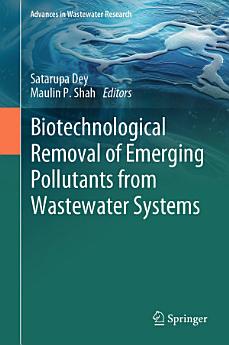Biotechnological Removal of Emerging Pollutants from Wastewater Systems
About this ebook
Both industries and anthropogenic activities generate pollutants of different types which have affected human health and have destroyed biodiversity at multiple levels. They largely consist of personal care and pharmaceuticals products produced by different industries. Most of these emergent contaminants cannot be removed by conventional water treatment procedures and are released in surface water. They further contaminate groundwater, soil, sediments and oceans. More efficient and improved treatment systems are required to remove such emerging contaminants. Various microbes can play crucial role in bioremediation by elimination, degradation, detoxification, and immobilization of pollutants. Most of these microbes are versatile in nature and can survive in a wide range of environmental conditions. Furthermore, they can be applied to different pollutants. Microbial degradation and bioremediation can be considered as useful and effective treatment options for emerging pollutants.
About the author
Satarupa Dey is an assistant professor in the Department of Botany, Shyampur Siddheswari Mahavidyalaya, affiliated under the University of Calcutta, West Bengal, India. She was awarded her Ph.D. from the University of Calcutta. Her research expertise is bioremediation of toxic metals. She was selected as a research fellow of the Department of Biotechnology, Government of India, and later she worked as a visiting scientist in the Agricultural and Ecological Research Unit of Indian Statistical Institute, Kolkata. She is the recipient of the Woman Scientist fellowship and start up grant from the Department of Science and Technology, Government of India. Her primary research interests include bioremediation of toxic heavy metals, plant growth promoting microbiome and microplastic bioremediation. She has published many journal articles and book chapters.
Dr. Maulin P. Shah is interested in genetic adaptation processes in bacteria, the mechanisms by which they deal with toxic substances, how they react to pollution in general and how we can apply microbial processes in a useful way (for example, bacterial bioreporters). One of his major interests is to study how bacteria evolve and adapt to use organic pollutants as novel growth substrates. His research work focuses on the impact of industrial pollution on microbial diversity in wastewater though cultivation dependant and cultivation independent analyses. His major work involves isolation, screening, identification and genetic engineering of microbes for the degradation of hazardous materials. He has more than 450 research publications in highly reputed national and international journals. He manages the research programs at Enviro Technology Ltd., Ankleshwar, India. He also serves as a reviewer in various academic journals.






